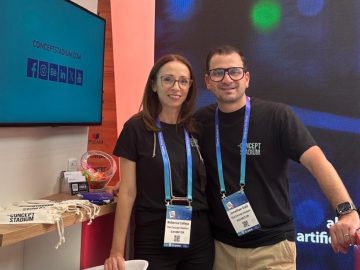Ignore the doomsayers, says Ian Flynn of Rocketmill. AI will reshape, rather than eliminate, your role. Here’s what tomorrow’s marketing jobs might look like.
It’s inaccurate to say the AI revolution is coming. Plainly speaking, it’s already here and it’s shaping the creative landscape. While some fear being replaced by robots, the reality is far more exciting. AI will be a powerful tool, but human creativity will remain essential.
So let‘s dispel the myth: AI won‘t eliminate us but it will transform our roles. Here are my predictions for the sorts of things we could be doing in the not-too-distant future.
The Concepter
This function will encompass roles such as those of creative directors, directors, and creatives. The concepter will be responsible for all things relating to human empathy and storytelling. Imagination is the name of the game. Concepters will be the gatekeeper of outputs – and ensure that whatever is made is aligned with the vision.
Strategic insights and briefs will be delivered faster. AI will be able to assess the market and give consolidated strategic insights at the click of a button, letting you dive into problem-solving faster.
Powered by AI
Explore frequently asked questions
The possibilities of ideas become wider. The concerpeter won’t be limited by production budget. AI will generate incredible results faster, without as much need for heavy-lift shoots. Options that would never be possible before – without an enormous amount of post-production work – may now be viable, like skydiving babies or a tuxedo-wearing velociraptor. Yeah, why not?
These roles will likely bounce off AI for inspiration. Imagine a friendly AI chatbot who can spitball thoughts with you and share references for you to explore. It might not be as effective as a creative partner, but it‘ll be able to get you out of a creative rut now and then.
The Actualiser
This includes art directors, copywriters, directors of photography, editors, motion designers, sound designers, and graphic designers. Creative prompting will be central in this role. Actualisers will need to be masters of all things executional. Your craft is as valid as ever, but it’ll likely be put into practice in different ways.
The software used in this role will become more powerful. AI-powered programs will streamline workflows, letting you focus on giving instructions and less on manual tasks. Production will be achieved with a few taps of the fingers. Videos will be created without any traditional production phase. Executional experts may work together digitally to prompt outputs, based on the director’s vision. This‘ll open up more possibilities creatively, but it probably won’t be as fun. And no more shoot loot, I‘m afraid.
For this role, you‘ll need to know what makes AI tick. Think of AI as a very intelligent dog, and you‘ll need to be its even wiser trainer. You’ll need to be the expert in all things regarding your craft. Rather than just doing it, you’ll need to be able to teach doing it.
The Protector
Creative producers, operations directors, account managers, and project managers – this is you. The protector will keep things moving and make sure that no one gets sued. This role is the trickiest to navigate – due to the apparent lawlessness of the current status quo – but it’ll be one of the most important as AI continues to develop.
Expertise in the technology‘s legal landscape will be crucial. AI works on references it’s being fed, which is a big red flag when it comes to intellectual property. You’ll need to spot problems as they arise and have a watertight understanding of the laws in place when they are in place.
Protectors will have to be masters of every AI platform available. It’ll be their job to put the right tools in the right people’s hands and to ensure they’re used in the best ways possible. Project management tools will become more advanced. Manual tasks will be reduced, and the protector will instead be the person at the top pulling the levers when required. Scoping and planning will become faster and more accurate.
The Engineer
Digital designers, developers, and dynamic creative optimization specialists will fall into this role. The engineer will be responsible for gaining industry advantage through product innovation. The rare breed of creatives who can code will be at the front of the line, telling the others where to go.
The engineer will need to know how AI works. To master new AI innovations and platforms, they‘ll need to be au fait with the technology and how it functions. They‘ll experiment with different frameworks. Early AI frameworks will make for a dynamic landscape, with experimentation paving the way for dominant players.
This area of innovation will be incredibly lucrative if done right. Solutions will benefit your company as well as your customers. Not only could your customers and colleagues benefit from your tools, but your company is also likely to benefit competitively too.
Suggested newsletters for you
Daily Briefing
Daily
Catch up on the most important stories of the day, curated by our editorial team.
Ads of the Week
Wednesday
See the best ads of the last week – all in one place.
The Drum Insider
Once a month
Learn how to pitch to our editors and get published on The Drum.
So, that‘s it… and, whatever role you decide to take, rest assured that everything you know now is still valuable. To really be useful within a creative advertising context, artificial intelligence will need to thrive along with human intelligence. Of that I am confident.
While there‘s no hiding the fact that our current roles will almost certainly change, I’m personally ok with that. Are you?




